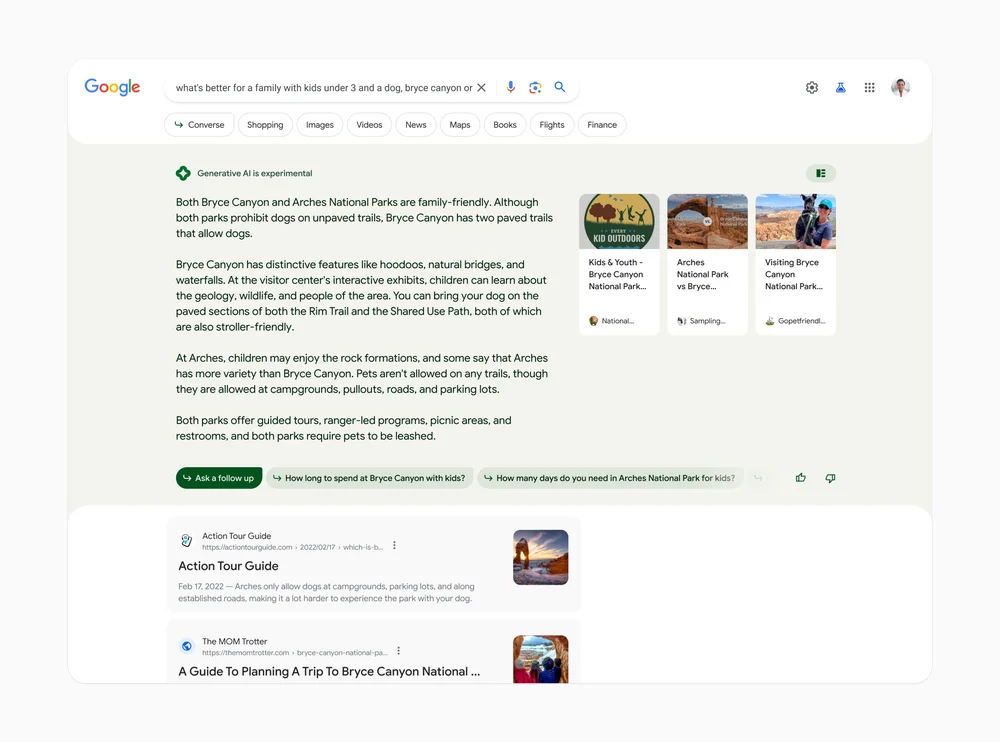Google Search Generative Experience (SGE) and Generative AI in Search: the Next Evolution in Search Marketing

It’s amazing what can happen in just a year! In this article, I’m going to discuss some of where we’re going this year thanks to Google SGE and Generative AI in search. I know that doesn’t mean a lot quite yet – sounds like a lot of buzz words I know – but give me a few minutes of your time and I’ll explain.
A Discussion on Generative AI in Search
What is Generative AI in search?
Generative AI simply refers to generation of something done by AI. In this case, we’re talking about a search engine’s ability to not just provide a results listing, but literally a response to a question asked in the search engine. While we’ll get to the hows and whats in a bit, when we say generative AI in search – it’s literally you typing or asking in voice search a search engine a question like “When is the best time of year to visit Walt Disney World with small children?” and the search engine responding with date ranges and providing suggestions.
A History of AI and Its Relationship with Search
First, a quick recap of some critical items in artificial intelligence (AI) over the past year:
- November 30, 2022 – ChatGPT launches with a free preview; within weeks the web and world are abuzz about the platform.
- February 1, 2023 – ChatGPT Plus is launched and is ChatGPT’s first paid platform. Over the course of 9 months, ChatGPT reaches 100 million users faster than TikTok which reached 100 million in two and a half years. (Reuters)
- February 7, 2023 – Microsoft is the first to strike in the AI in search field announcing that ChatGPT features were coming to Bing. (Search Engine Journal)
- March 21, 2023 – After a great deal of debate, Google launches Bard – its ChatGPT alternative – ahead of schedule. (Search Engine Journal)
- March 31, 2023 – Italy bans ChatGPT for collecting personal data and a variety of other reasons. (New York Times)
- April 28, 2023 – Italy allows ChatGPT again after meeting regulation standards (The Verge)
- May 10, 2023 – Google announces Google Labs access and beta testing for Search Generative Experience (SGE) using Bard. (Google)
May 10, 2023: When Google Changed
From this point – we can get into each of the ChatGPT and Bard updates but this moment on May 10 of last year was pivotal. I was one of the early beta testers for SGE and I have to admit – it is impressive. It wasn’t available to everyone – only if you signed up for the test in Google Labs.
Google, OpenAI (the creator of ChatGPT) and a wide variety of other companies have long been working on tools that would use artificial intelligence to simplify our lives. That can mean a lot of things, but from a strictly search perspective, the quesiton they were trying to answer is this: how can these platforms literally help give you the answer faster or provide you the exact details you’re looking for in one search?
As you’ll see in the example below from this experiment, using Google SGE, if you do a search and ask a question, Google’s response would provide a direct answer as well as links from where its response came from on the right hand side. This answer uses Bard as well as natural language processing (NLP) to provide the answer to the question that was being asked. Then, directly below, it provides perspective followup questions as well as an opportunity for you to ask a followup question. Using these tools, context is carried over from question to question so Google would understand what you are asking and continue the “conversation.”

These same tools also apply to shopping – giving you information on pros and cons of products, product descriptions, reviews / ratings, prices, and product images. This tool – uses both Google’s Shopping Graph and its latest in AI technologies.

Google Earnings Calls: A Development
In Google’s second quarter earnings call – SGE was spotlighted. CEO Sundar Pichai pointed out the positive feedback received from SGE and how the system is learning to “connect dots” between topics. Additional discussion was had regarding testing and how SGE might be used to deliver ads in the future.
Furthermore, in Google’s third quarter call Pichai expanded on their findings regarding incorporating video and images into responses and prioritizing how they can continue providing value to users and traffic to publishers through SGE.
The End of the Google SGE Experiment?
Initially, we as digital marketers expected this experiment to end in December 2023 – however as reported by Search Engine Journal – the latest redesign of the Google Labs website removed the end date for the experiment. In the article mentioned below, SJE staff writer Kristi Hines goes on to discuss what she believes would be next regarding generative AI in search. In a study published by Statista, 49% of surveyed adults want AI-powered online search (followed by smart assistants and recipes). So, while marketers are salivating over the opportunities to create iterative and scalable content – people clearly are interested in how generative AI in search can improve their lives. In that same study, 40% of millennials were willing to switch to an experience like Google SGE (shared above) and 29% overall would switch to AI-powered search.
In addition, due to the large amount of data that Google collects, they’ve been able to leverage this information with a new product called Gemini – a family of large language models (LLMs) that boost response speeds for generative AI search. It is believed that using both Google’s AI platform Bard, along with Gemini, will likely allow Google to eventually catch up with ChatGPT. There are a lot of other things in the details regarding Google DeepMind and more – but they’re simply highlighting the point we want to make – Google Search is changing and will in 2024.
Generative AI in Search: How does this affect me?
While there is still a lot we’ll be learning over the next year, here is what we at Forum do know.
Advertising in 2024
This is one of the big questions digital marketers are asking – how will advertising work in generative AI for search? The answer is – we’re not quite sure. While it’s possible that ads may appear in this listing, there may be clever new advertising opportunities in the near future. We’ve internally brainstormed about what this could be – and some ideas are intriguing. Will we be able to sponsor answers to queries? Will you have to pay to play in certain frequently asked queries? Will your ad appear as a source or below the sources from which the query was pulled? Will this provide new advertising opportunities in the Local Pack?
The Local Pack
In a study done by BrightEdge, over 1/3 of its responses provide information regarding what we call the Local Pack – or a response from Google Maps / Google Business Profile regarding the location of or information to find a local provider for a service of some sort. If this is correct, once this is fully implemented this means that the impact of these new tools can and will affect local businesses. This could be good or bad dependent on the preparedness of the company – and may mean that digitally-savvy local businesses are going to easily win in this new space. It’s all new, but getting ready now may be worth considering. We know that Google Local Services – a topic we’ll cover in a future blog post – is going to be a dominant tool for local businesses. However, does this mean that the new Google Guaranteed feature is going to be part of this new era of search marketing more so than it already is?
The Biggest Impact by Industry
Just last week, the managing editor of Search Engine Land Danny Goodwin published an article based on new data from BrightEdge regarding SGE.
There is a category of queries we – and Google – call Your Money or Your Life (YMYL) type queries. These queries are those that are personal in nature and deal with an individual’s needs or services that they may need. In the study, it found that a number of queries (searches) in this category were heavily impacted with SGE search results – and most of all healthcare. of those searches that occurred in healthcare, 70% of the searches showed a truncated generative AI response rather than just the traditional search listing. That’s more than double the second closest category where the results were simply collapsed for an AI response. A number of other areas including eCommerce, B2B technology, education, and others offered an “Opt-In” where users could request and AI-generated answer.

From the Search Engine Land article, co-founder of BrightEdge Jim Yu stated that “marketers will have less of a say in the customer journey. Google will have the ultimate opinion on the quality and relevancy of your brand. This will have a massive impact on all types of marketers in every kind of industry.”
Final Thoughts on Generative Search in AI
I’ve said this before, but it’s worth repeating. We believe in branding at Forum. It’s become critically clear that having a stable brand where people can easily understand who you are is important. That directly reflects in the thoughts and opinions of others of you online as well. That means that reviews and opinions of a brand matter. And, how else will AI be able to determine if your brand is worthy of presentation if you haven’t done the work to prove your value?
Traditionally, our focus in search has been creating valuable web content that is worth linking to. That still holds true. But, if a standard web user is going to spend more time talking to Google and less time going to our client’s websites for its responses – we’re going to have to make sure that our focus isn’t just standard SEO – that’s part of it – but we have to build brands worth following. No more is the day when keyword research, good content, and few backlinks is enough. While I may be wrong – but in my opinion, if organizations both big and small don’t start with brand and allow it to filter through their organization down to the final touches of a technical SEO strategy – those businesses will struggle to find a place on the web in the near future.
Back
